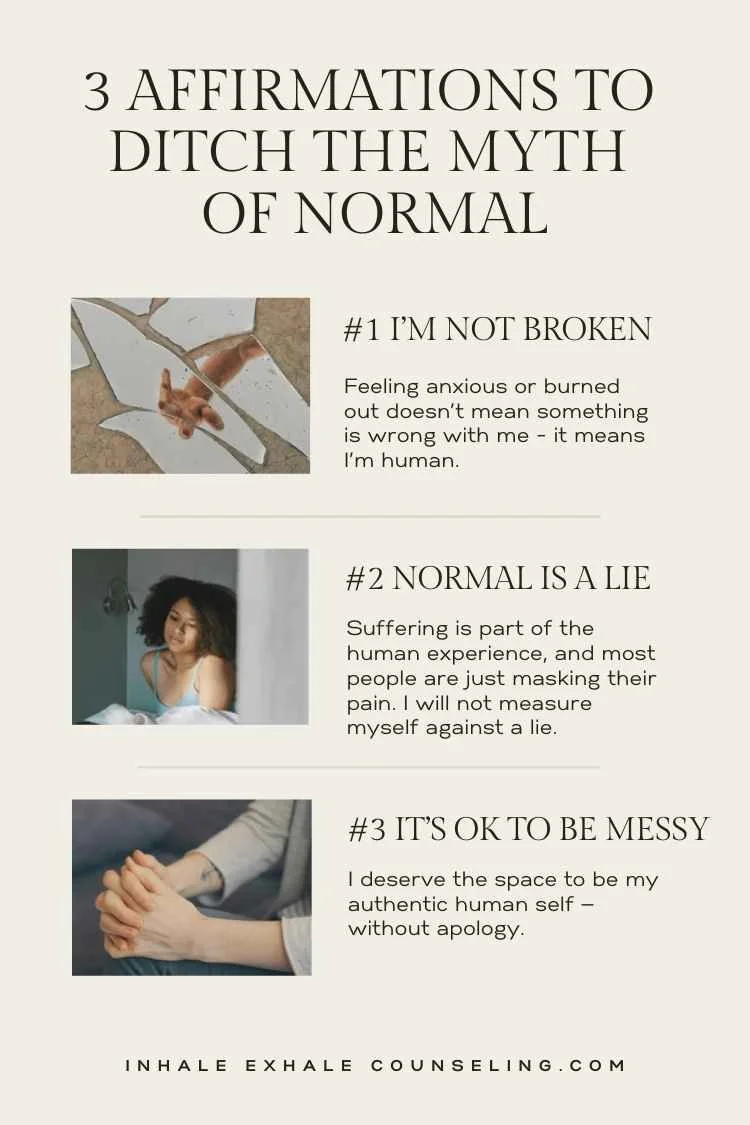Will Therapy Fix Me?
Why You Feel Broken, Why “Normal” Is a Myth, and How Therapy Actually Helps
Reframing the Path, by licensed therapist Melissa Rolfes, is your guide to making the most of your therapeutic journey, helping you feel more confident and effective every step of the way. The information provided here is for educational purposes only, and is not a substitute for professional mental health or medical care, nor does it establish a therapist-client relationship. If you're experiencing distress and feel unable to keep yourself safe, please access these resources.
A lot of people come to therapy with this quiet, painful question in the back of their minds:
What if something is seriously wrong with me?
It’s not always spoken out loud, it shows up in other ways: apologizing for crying, trying to sound “put together,” worrying that your problems aren’t valid enough to be in therapy… or too big to ever get better. Underneath all of it is the fear that you’re broken in some deep, unfixable way.
Here’s the truth:
You’re not broken. And there is no such thing as normal.
Life is messy. Emotions are messy. And therapy? It’s not a repair shop. It’s not where you go to be “fixed.” It’s a place to get honest about how hard it is to be a person sometimes, and to learn how to navigate that without shame.
In his book Saving Normal, psychiatrist Allen Frances talks about how the mental health field has sometimes overreached—labeling everyday sadness, worry, or discomfort as disorders.
While a diagnosis can be a helpful tool, it’s not the whole story. Most of what people bring into therapy (burnout, anxiety, grief, relationship stress, self-doubt) is just the human condition. And you don’t need to be “sick enough” or wait until you feel worse to deserve help. This is your permission to stop waiting.
Why We Think We Need to Be Fixed
I think a lot of us grow up believing that feeling overwhelmed, emotional, or unsure means something’s wrong. We’re taught to tough it out, stay in control, or push through. So when things start to feel heavy, the instinct is often: Okay, I just need to fix this. Fix myself.
I see this all the time in therapy, people come in hoping for a quick solution, a plan, a reset button. And I get it. You just want to feel better. You want the anxiety to stop. You want to stop overthinking every little thing or crying in the car after work. You want to feel “normal,” whatever that means.
But here’s the truth, and I say this with so much compassion:
There’s nothing wrong with you in the way you’ve been taught to believe.
We’ve all been shaped by systems that equate worth with productivity. Toxic capitalism rewards burnout, numbs empathy, and pressures us to “get over it” instead of feel it. We’re conditioned to prove our value through what we can produce, how quickly we bounce back, how well we can pretend we’re fine.
So of course you think you’re the problem when your body says, enough.
Of course it feels like you’re failing when you can’t keep up with impossible standards.
But wanting rest, needing support, feeling the weight of it all — that’s not failure. That’s being human in a system that constantly asks too much.
Wanting to be “fixed” is often just another way of saying, I want to feel safe. I want to feel like I make sense.
And therapy? It can help with that, not by “fixing” you, but by helping you understand what’s actually going on underneath it all.
If you would like to learn more about “normal” and mental illness as they relate to white supremacy and capitalism, check out this article.
You’re Not Broken , You’re Human
So many people come into therapy thinking they’re the problem. That if they could just be less sensitive, more motivated, more like everyone else… they’d be okay. But most of the time, what they’re going through makes perfect sense once we talk about it.
You’re not broken. You’re responding to life , probably in the exact way you had to at some point.
Maybe you grew up in chaos, and now your brain is always scanning for what’s about to go wrong.
Maybe you had to be the strong one, so asking for help feels like weakness.
Maybe you’ve learned to mask your stress with perfectionism, or to numb out completely just to get through the day.
None of that makes you defective. It makes you human.
We’re all walking around with a mix of protective strategies, unmet needs, and emotions we’ve been told are “too much.” But therapy doesn’t exist to stamp those things out. It exists to help you understand yourself more clearly, to sort through what’s old survival, what still serves you, and what’s ready to shift.
You don’t need to become someone else. You just need space to come back to yourself.
To learn more about the myth of normal:
Dr. Allen Frances, MD: Saving Normal: An Insider’s Revolt Against Out-of-Control Psychiatric Diagnosis, DSM-5, Big Pharma, and the Medicalization of Ordinary Life
Roy Richard Grinker: Nobody’s Normal: How Culture Created the Stigma of Mental Illness
What Therapy Actually Offers (Instead of a Quick Fix)
Therapy isn’t a makeover. It’s not about polishing yourself up until you finally become some better, more acceptable version of who you are.
What it actually offers is space, space to slow down, to notice what’s underneath the surface, to make connections you maybe haven’t made before. It gives you a place to get curious instead of judgmental. To name things you’ve never said out loud. To feel what you’ve had to suppress just to function.
It’s not about “fixing” symptoms as fast as possible, although yeah, sometimes therapy does help you feel better in a concrete way. But more often, what changes first is how you relate to what you’re feeling.
That’s when therapy starts to feel like it’s working:
When you notice a thought and pause instead of spiraling.
When you feel anxious and remember to breathe instead of shutting down.
When you start to recognize patterns, and they stop running the show.
When your inner critic isn’t quite as loud as it used to be.
Those moments might seem small, but they’re the real work. That’s healing. That’s integration. And over time, those shifts build on each other in powerful ways.
Click here to read more about how to choose the right therapist for you…
The Bottom Line
Therapy won’t fix you, because you’re not broken.
But it can help you understand yourself, feel more grounded, and move through life with a little more clarity and self-compassion. It can help you let go of the pressure to be “normal,” and start responding to your needs with care instead of shame.
Being human is messy. That doesn’t mean you’re doing it wrong.
If any part of this resonates with you, if you’ve been stuck in the waiting room of “I’ll reach out when things get worse,” you don’t have to keep waiting. You don’t have to figure it all out on your own.
Are you looking for an affirming and effective therapeutic experience?
I work with adults across Virginia through online therapy, helping folks untangle anxiety, perfectionism, burnout, and all the messy layers underneath. If you’re ready for a space that’s honest, supportive, and empowering, I’d love to connect.







